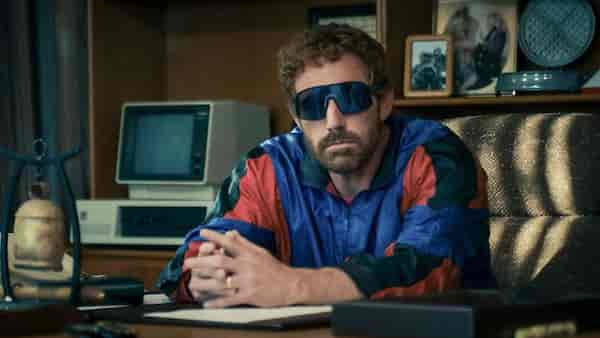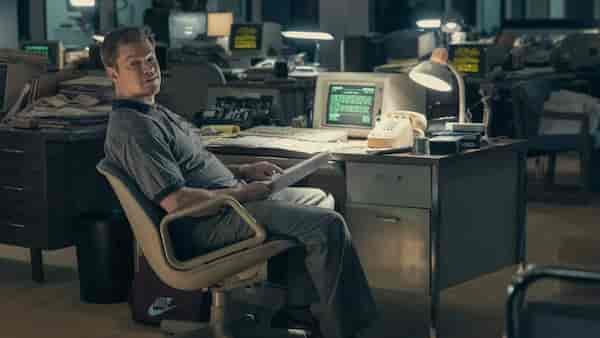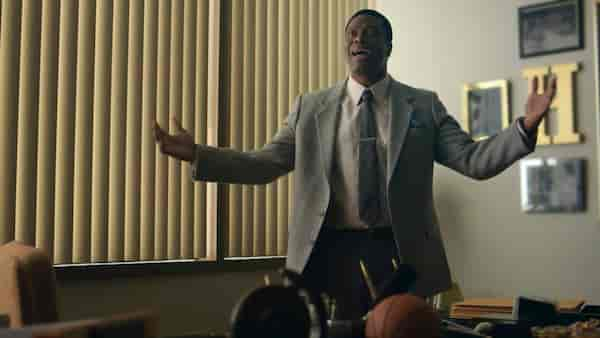Newsletter | Ben Affleck, Viola Davis & Matt Damon Make 'Air' A Slam Dunk
Air is both a shiny exhibition game and a pensive playoff final, writes Rahul Desai in this week’s #CineFile, where we go beyond the obvious takes, to dissect movies and shows that are in the news.

Last Updated: 01.44 PM, May 10, 2023
This column was originally published as part of our newsletter The Daily Show on May 10, 2023. Subscribe here. (We're awesome about not spamming your inbox!)
***
AIR should not work. It has no business to. On paper, Alex Convery’s script — a dramatisation of the origins of Air Jordan, the iconic basketball shoeline — is a 112-minute ode to post-modern capitalism disguised as the American fairytale. A bunch of suits conspire to crack a deal for their mega corporation — and we’re supposed to root for them? It doesn’t help that the team in focus represents the most famous brand known to man. In what solar system is Nike — the Nike — the underdog? How are we supposed to understand that, in some detached dimension of the past, Nike was the David to the Goliaths of Adidas and Converse? How are we to trust Air as a film and not just another slick Nike advert? How are we supposed to look at the company’s executives as humans and not vultures preying on yet another unwitting client? It’s hard to fathom. It’s even harder to pretend like something is at stake.
Enter Ben Affleck. The actor-director stages Air in the grammar of a journalism movie. One character sees what others don’t, and fights for his conviction, slowly turning the naysayers into believers in pursuit of a phantom truth. It’s entertaining, chatty, whippy, sappy and urgent. The conversations and pitches are the action set pieces. A phone call is a ticking time bomb. A meeting is a monologue full of a copywriter’s finest phrases. No damage will be done if the protagonist doesn’t succeed. At worst, a brave headline won’t see the light of day — or, in this case, a small division of a billion-dollar company will shut down. It’s an underdog story in the sense that the odds — unlike Affleck’s Oscar-winning Argo — aren’t a matter of life and death. They’re a matter of life and progression. Visionaries are heroes who save the world from due process; they don’t make history so much as reimagine the future.

So when the central character of Air — Nike’s star basketball scout Sonny Vaccaro (Matt Damon) — pursues an 18-year-old rookie named Michael Jordan, he is not just striking a shoe deal. He is reporting on the reality of the modern-day viewer. He is modifying sports into the soles of our feet — soles that allow us to move faster, navigate deeper, idolise quicker and reach a future where the greatness of athletes lends numeric meaning to the ways we live. “A shoe is just a shoe until someone steps into it” is the film’s MVP line, but Air becomes evidence that time is just time until someone beats the clock. At the end of the day, it’s about a stubborn basketball fan — who just happens to work at a shoewear firm — reminding a talented teen that his destiny transcends the game. Jordan might never have been Jordan if not for the validation and aura bestowed upon him by the pathbreaking deal. And Nike might have never been Nike if the player hadn’t trusted them to be his story. A homegrown equivalent would be the 100-crore Mark Mascarenhas-Sachin Tendulkar deal in the late 1990s, which shifted the landscape of Indian celebrity. I’d like to believe it renewed Tendulkar’s faith in his own genius: It’s never about the money, it’s about the currency of belief.

All the indoor hustling in Air makes it the perfect companion piece to the best biographical sports drama of this generation. It works for the same reason Moneyball does. Moneyball was about a former baseball player who — after being crushed by the ways of sweet-talking talent scouts — becomes a General Manager who changes the way the game is played. Air is about a basketball scout who — after being bored by the ways of sweet-talking company executives — becomes a cultural broker who changes the way the game is lived. One of the first scenes of this film, in fact, shows Sonny seated at a table of executives with a dismissive energy that’s nearly identical to Billy Beane’s in Moneyball. Matt Damon’s initial gait even brings to mind the late Philip Seymour Hoffman, who played the cynical coach to Brad Pitt’s Beane. Damon’s latter gait is an amalgamation of both a deadpan Pitt and an excited Jonah Hill. To the actor’s credit, he lends a lightness of touch to Sonny Vaccaro, morphing the character’s journeyman energy into a bristling strength — you go along with him because you believe it’s the first time in years that Sonny feels inspired. It’s not a slow-burning transformation, though; it’s a late-night brainwave, as simplistic as it is endearing. Sonny watches the famous footage of Jordan beating the buzzer in the 1982 NCAA final, coupled with an Arthur Ashe racket advert. That’s the cinema of epiphany.

The only problem with Air — apart from its Nike-promo-styled speeches (complete with visual montages) — is that Sonny and his team behave like figures carved out of hindsight. They speak and sound like people who know the final outcome; they seem to know how the ‘Air Jordan’ goes on to revolutionise America’s bond with pro-sport. At first, you sense they’re fighting for survival, and for the bragging rights of defeating their rivals. But Sonny’s mission often plays out like a flashback, where a company is reminiscing about their success through the lens of rose-tinted nostalgia. The performances are equally prescient — Damon and Affleck (as Nike CEO Phil Knight), Jason Bateman (as marketing chief Rob Strasser) and Chris Tucker (as VP Howard White) barrel towards a feel-good conclusion — as if signing Jordan is the reward rather than the risk itself. I suppose that’s the catch in fact-based stories, where the film has to constantly choose between its own identity and its preordained relationship with the audience.
That said, this retrospective tone results in the most significant triumph of Air. The narrative builds up to the suspense of a ‘Yes or No’ phone call of course. If it had ended right there, Air would have been pure and good-looking Nike propaganda, nothing more. Yet, this is when the film gives its strongest performer — Viola Davis as Michael Jordan’s mother, Deloris — the power to reframe Air as a stitch in all-American time. It reverses the social agency of the story, reframing the Jordans as protagonists who thrived on being the backdrop of a workspace dramedy. It was an underdog family and community story all along, wearing the crowd-pleasing robes of a corporate song. The real ending becomes a reminder that a pitch is only an empty promise until someone personalises it. There’s a sense, in this moment, that Air zooms out from its atmosphere — Michael Jordan, Nike, basketball — and views the deal from the universality of collective space. The mother’s words don’t stop the rotation of the planet; they merely revise the evolution of the world.

 Premium
Premium